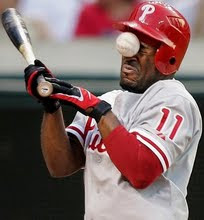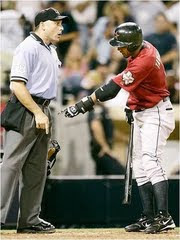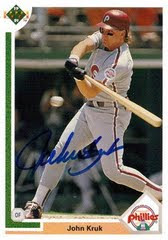Listen, I get it. In the film, the 2002 Oakland A's appear to be one of the worst teams in the league held together by rubber bands and Scotch tape. The film needs to creatively, yet realistically show the internal struggle that was at the heart of Michael Lewis's New York Times Best Seller of the same name: a team fighting back against the traditionalism of Baseball using advanced statistics. As such, a closer like Jason Isringhausen needs to be lumped in with Giambi and Damon and his loss needs to be also treated with the utmost reverence.
In reality, the 2002 A's, even without Jason Giambi and Johnny Damon, and yes, even without Jason Isringhausen, were a damn good team. Oakland still had stud third baseman Eric Chavez, future World Series MVP Jermaine Dye, 2002 MVP Miguel Tejada and one of the best rotations since the mid-90's Atlanta Braves including a young Aaron Harang and Cory Liddle and the fearsome trio of Mark Mulder, Tim Hudson, and 2002 AL Cy Young winner Barry Zito.
The lack of players not discussed in the film and the rotation that's rarely discussed in the book as well seems to be the main sticking point with a lot of fans. Sure Scott Hatteberg and David Justice were fine players, but you're not going to mention that both the AL MVP and the AL Cy Young came from this team as well? How dare you sir!
Again, I get it. It's hard to adapt a book that's all over the place that Moneyball actually is while also still including its themes all while making it palatable for a mainstream audience. As such, the film overwhelming is a creative success, even though it comes at the expense of the majority of excellent players.
But that's not what this blog post is about. I'm not here to discuss the differences between the film and what actually occurred in real life. I'm here to discuss the plot holes that exist solely within the text of the film. If you want more information about many major differences between the film and historical record, I'll put a list together at the end. But for now, here's the glaring errors I notice when watching the film for the 50th time. These are the plot holes of Moneyball.
Carlos Peña
Trying to replace the production that Jason Giambi gave your team after he leaves for the New York Yankees is actually cause for concern. Billy Beane (played by Brad Pitt) and his scouts, and later with his assistant GM Peter Brandt (played by Jonah Hill), have several discussions about who is going to play First Base for the 2002 A's. Ultimately, that player is former catcher Scott Hatteberg (played by Chris Pratt). So then, where does Carlos Peña come in?
Within the internal logic of the movie, Billy Beane is forced to trade away Carlos Peña because his manager Art Howe (played by Philip Seymour Hoffman) keeps playing him at First Base over Hatteberg. But why is this even an issue? If Billy Beane wanted Hatteberg to play First, why is Peña even on the roster in this universe?
Further, why wasn't Carlos Peña a player discussed in these internal meetings during the offseason? If Peña was in the A's farm system at the time, maybe his name should have come up during these discussions. The "Hey, we're losing Jason Giambi so let's bring up our prospect Carlos Peña" talk seems like it should have been had in this film.
I assume what actually happens within the universe the film takes place in is what actually happened in real life in that Billy Beane trades for Peña from the Texas Rangers. That's even more baffling to me. As an audience member, we see Billy Beane struggling to determine who should replace Jason Giambi and he actively makes a trade for his replacement, but also is fighting with his manager that he's playing the player Billy Beane just traded for? That's very confusing.
Also, the A's play in the American League and have a DH. If David Justice is playing in Left like he does in the film and Art Howe doesn't want Hatteberg's defense on the field, just DH Hatty and then Peña can play First.
Are the Boston Red Sox Smart?
You're trying to replace Johnny Damon. The Boston Red Sox see Johnny Damon and they see a star who is worth $7.5 million a year. When I see Johnny Damon, what I see is... an imperfect understanding of where Runs come from. The guy's got a great glove, he's a decent lead off hitter, he can steal bases, but is he worth the $7.5 million a year the Boston Red Sox are playing him? No. No!... If you want full disclosure, I think it's a good thing you got Damon off of your payroll. I think it opens up all kinds of interesting possibilities.
David Justice Doesn't Understand His Contract?
Billy Beane: We got a problem, David?David Justice: Nah, s'ok. I know your routine. It's patter; it's for effect, but it's for them, alright? That shit ain't for me.BB: Oh, you're special?!DJ: You're paying me 7 million bucks a year, man, so, yeah, maybe I am. A little bit.BB: No man, I ain't paying you 7. The Yankees are paying you half your salary. That's what the New York Yankees think of you. They're paying you $3.5 million to play against them.
The Chicago White Sox Are Dumb
- "With Carlos Peña gone, Billy [Beane] re-baited his hook with Cory Lidle...Kenny Williams, GM of the Chicago White Sox, expressed an interest in Lidle. Billy suggested a package that would yield, in return, the White Sox's slugging outfielder Magglio Ordoñez. The White Sox declined, but that conversation led to another, in which Billy discovered that the White Sox were willing to part with their leadoff hitter, Ray Durham. To get Durham and the cash to pay the rest of Durham's 2002 salary, all Billy had to give up was one flame-throwing Triple-A pitcher...
Ray Durham, acquired on July 15, had been a Fucking A trade (It quickly inspired an article on baseballprospectus.com, the leading sabermetric Web site, with the title: "Kenny Williams, A's Fan.") In getting Durham, Billy got a lot more than just half of a season from a very fine player. Durham would be declared a Type A free agent at the end of the season. Lose a Type A free agent and you received a first-round draft pick plus a compensation pick at the end of the first round."
- "When Kenny Williams told Billy [Beane] an hour before that the White Sox were taking [University of Kentucky starting pitcher Joe] Blanton, Billy couldn't but agree that it showed disturbingly good judgment. Blanton was the second best pitcher in the draft, in Billy's view... A White Sox voice crackles on the speakerphone: "The White Sox selects redraft number 0103, Ring, Roger,. Left-handed pitcher."... "You fucking got to be kidding!" hollers Billy, overjoyed... "Ring over Blanton? A reliver over a starter?"
______________
Differences Between IRL and the Movie
- Billy Beane was using advanced statistics long before the 2002 season. He embraced them when he was working under former A's GM Sandy Alderson.
- Jonah Hill's Peter Brandt is based on Beane's Assistant GM Paul DePodesta. A few years later, DePodesta was given the Dodgers GM job and failed. He's currently working in the NFL for the Cleveland Browns.
- The person who probably gets the biggest shaft in the movie is Art Howe. In the film, he's portrayed as this symbolism of Old Baseball standing in the way of Billy getting to do what he wants, and spends much of the film upset he isn't being given a new contract. In reality, Howe was signed through the 2003 season (at the time) and was a "team player" in embracing sabermetrics.
- As mentioned earlier in this post, the Island of Misfit Toys that's portrayed in the movie still managed to produce both the AL Cy Young winner and the AL MVP. In 2002, Barry Zito had a 23-5 record with a 2.75 ERA, 3.87 FIP, and 4.5 fWAR. Ironically, thanks in large part to the Moneyball philosophy, if Zito had put up those numbers or something similar, he probably wouldn't have won the award because we've moved past the emphasis of Wins on Cy Young voting. Though like the movie, the book also doesn't put a great emphasis on pitchers, mainly because the advanced statistics touted at the time were more geared towards batters than pitchers.
- The 2002 A's had two legit MVP candidates on their team, neither of which are really mentioned in the movie. The actual winner was SS Miguel Tejada. He slashed .308/.354/.508 with 34 home runs, good for a wRC+ of 129. What really helped his case was his 108 runs and 131 RBIs. Tejada's fWAR that year was also 4.5, brought down by his poor defense. If I was blogging back then, I would have argued that the MVP should have gone to Tejada's teammate Eric Chavez. In 2002, Chavez slashed .275/.348/.513 with 34 HRs, good for a 125 wRC+. Tejada has the slight offense edge there, and Chavy only scored 87 runs and batted in 109, but what really separated him was his defense. Eric Chavez was an excellent defender which propelled his fWAR to 5.7. Further, there's an entire few pages in the book dedicated to Billy Beane fawning over Chavy to Michael Lewis about the third baseman is only 24 years old yet already on pace to be one of the greats.
- Billy Beane comes off as the Smartest Man in the Room in the book, and more often than not, rightfully so. But there are parts that don't age the greatest for him. The main one that stinks out in my mind are the A's hatred of Prince Fielder during the 2002 MLB draft. At one point, the book states, "Here's an astonishing fact: Prince Fielder is too fat even for the Oakland A's." Fielder ended up being drafted before Oakland could have take him anyways, and Fielder did have weight problems throughout his career, but the ridicule was unnecessary considering how great Prince Fielder's career turned out to be. The mockery of Fielder looks even worse for the A's considering their love of their overweight Minor League catcher Jeremy Brown that occurs throughout the book (he's briefly mentioned at the end of the film, using actually footage of Brown). Jeremy Brown got 10 ABs in the Majors. Prince Fielder is a borderline Hall of Famer. I mean, he's on the Hall of Fame ballot right now. Billy Beane is famously quoted in the book as "we're not selling jeans here" as a way for scouts to overcome their biases of what a baseball player should look like. The Oakland A's should have practiced what they preached in relation to Prince Fielder.
- Here is how the Oakland A's really felt about the departure of Jason Isringhausen: "Jason Isringhausen's departure wasn't a loss to the Oakland A's but a happy consequence of a money machine known as 'Selling the Closer.' In return for losing Isringhausen to the St. Louis Cardinals, the A's had received two new assets: the Cardinals' first-round draft pick, along with a first-round compensation pick."








0 comments:
Post a Comment